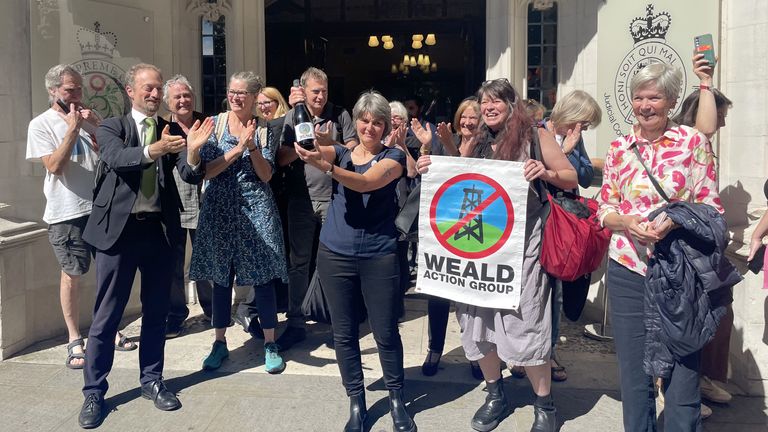The future of new oil and gas projects in the UK has been thrown into doubt following a landmark decision by the Supreme Court.
The court concluded the environmental impact of emissions from burning fossil fuels must be considered in planning applications for new extraction projects – not just the impacts of the emissions produced in extracting them.
The case hinged around an oil drilling project at Horse Hill in Surrey, granted planning permission by Surrey County Council in 2019.
Local campaigner Sarah Finch argued the environmental impact of the project should have taken into account not just the carbon emissions created in extracting the oil, but the environmental impact when they are burned.
She challenged an earlier Court of Appeal ruling dismissing her case, having also lost a legal battle in the High Court.
But the Supreme Court justices ruled on Thursday three to two in favour of allowing her appeal, and quashed the decision to grant planning permission for the site.
Speaking after the ruling, former Surrey resident, Ms Finch said she was “absolutely over the moon” adding that it was a “welcome step towards a safer, fairer future”.
In his judgement, Lord Leggatt concluded: “In my view, there was no basis on which the council could reasonably decide that it was not necessary to assess the combustion emissions.”
He went on: “Given the agreed fact that all the oil produced would be refined, I see no reason why environmental impacts resulting from the process of refining oil should not in principle fall within the scope of the EIA for the extracting of oil.”
The court did not conclude that fossil fuel emissions were unlawful, only that they must be considered in an environmental impact assessment (EIA) – a tool used in the planning process to assess the effects of a project on the environment.
In relation to the Horse Hill project Justice Leggatt said: “It is not disputed that these emissions, which can easily be quantified, will have a significant impact on climate. The only issue is whether the combustion emissions are effects of the project at all. It seems plain to me that they are.”
Given the burden of scientific evidence of the negative environmental impact of carbon emissions, the ruling that the downstream impacts of burning extracted oil and gas must be considered by anyone applying to extract them is significant.
The decision, from the UK’s highest court, could have immediate implications for other fossil fuel extraction projects facing legal challenge by environmental campaigners.
West Cumbria Mining (WCM), the company behind a coal mine in Whitehaven approved by the government in 2022, clearly felt this could be a possibility as their lawyers intervened in this latest case.
WCM did not respond to a request for comment on why it did so, but, if the campaigners’ appeal against the Surrey oil site wins next month, it could mean “that you have to completely reassess whether that coal mine in Cumbria can happen at all”, according to barrister Sam Fowles.
“It is extremely difficult to overstate the significance of this case,” Mr Fowles, who specialises in planning and environment law at Cornerstone Barristers, said.
It has the potential to trigger the “beginning of the end of… new fossil fuel extraction in the UK going forward”, he added.
The ruling could also have a bearing on offshore oil and gas projects such as the giant Rosebank oil and gas field in the North Sea.
While planning rules offshore are different, EIAs are also required.
Developers, or future governments, could argue that the economic or energy security benefits of extracting fossil fuels could outweigh the environmental impacts of burning them.
However, the ruling opens a new avenue for climate campaigners to challenge future oil, gas, or coal projects at the planning stage, where local authorities will be forced to consider the wider environmental impact of such developments when deciding whether to give a project planning permission.
The government is due to make a decision imminently on Rosebank.
Stephen Sanderson, chief executive of UKCOG, the company behind the Horse Hill project, described the court’s ruling as “rather perplexing”.
“[It] further underscores why the company’s focus over the past few years has shifted away from oil and gas and firmly towards creating and delivering strategic underground hydrogen storage, an essential element of the UK’s future low carbon energy system,” he said.
Offshore Energy UK, the body representing the offshore oil and gas industry have been approached for comment.



























